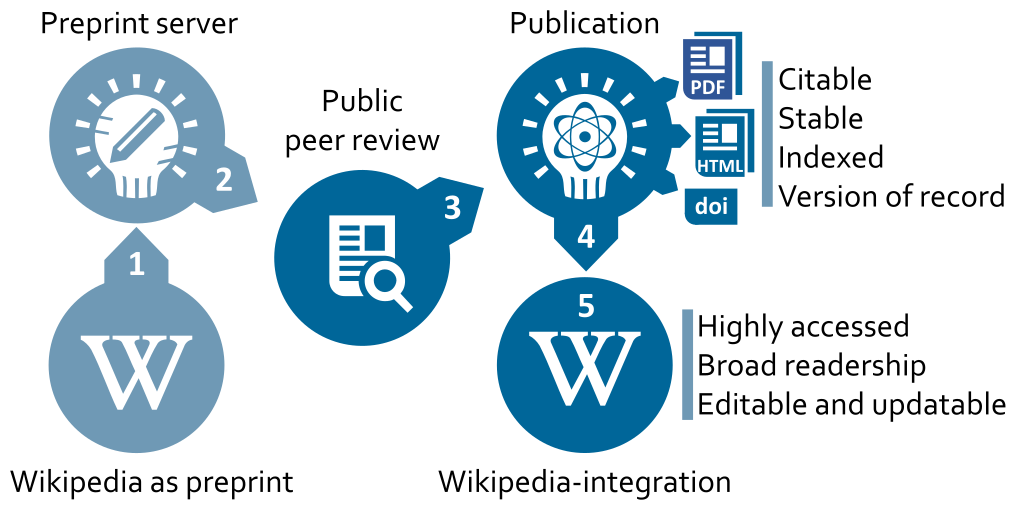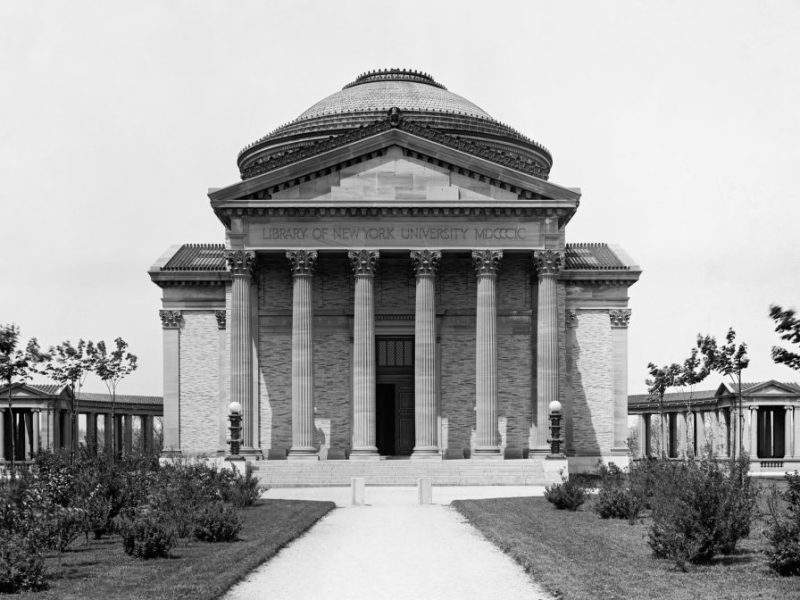Wikimedia, especially Wikipedia, hasn’t always had the best of relationships with academia.
So you may be surprised to learn that there’s a trio of Wikimedia academic journals that are now accepting submissions: the WikiJournal of Medicine, Science, and Humanities. All are run on a traditional academic journal model, including an extensive peer review process by academic peers and the publication of a version of record that can be disseminated and cited.
The journal operates under a free copyright license, meaning here that others can take and use the text for any purpose, so long as they credit the original source and share it under a similar license. This allows volunteer Wikipedia editors to port the high-quality text into Wikipedia, bringing it to the encyclopedia’s millions of readers “for added reach and exposure,” as the journals’ about pages declare.
This process also works in reverse: some of the articles published by these journals are actually Wikipedia articles, usually submitted shortly after one or more editors have re-written them. These journals allow recognized experts in the field to vet the material.
We wanted to learn more about this innovative publishing model, so we asked several members of these journals’ editorial boards a few questions. Here’s what they had to say.
———
Why a journal? What gave you all the idea to start one?
Mikael Häggström, editor-in-chief, WikiJournal of Medicine: The main reason that I started the first WikiJournal, WikiJournal of Medicine, was to allow academics to contribute to the world of open knowledge by scholarly publishing. It was also to improve the quality of the content by expert peer review. As such, anyone can then not only help gathering the sum of all human knowledge, but also build upon it. This also gives authors more opportunities to get credit for their works, even for material that has already been written in Wikipedia.
Marshall Sumter, editorial board, WikiJournal of Science: The WikiJournal of Science started as a potential host for student works and possibly useful Wikipedia articles for freshmen and sophomore STEM and non-science students. It evolved from there.
Thomas Shafee, editor-in-chief, WikiJournal of Science: I’d always been surprised at the difficulty of Wikimedia editor recruitment from the academic community. A journal format engages people who would otherwise never have contributed to a Wikimedia project (both as authors and as peer reviewers). Inspired by WikiJournal of Medicine and PLOS Computational biology, I felt that WikiJournal of Science could be a flexible journal with a broader STEM scope.
———
What benefits, unique or not, does the journal get from using a wiki?
Marshall: Open access, free of publication costs to authors, both anonymous and open peer review, and permalink and PDF for approved publication final form. A wiki provides readily available editing and commenting.
Thomas: The whole platform also encourages transparency. With the growth predatory publishers, it’s a great way to allow readers to audit the process for each article. Additionally, appropriate content can be easily integrated into other Wikimedia projects.
Andrew Leung, editorial board, WikiJournal of Science: Hosting provided by Wikimedia Foundation means that the project costs are kept minimal. Without publication and subscription fees, editorial decisions to publish articles (or not) are only based on academic merit, and free from financial incentives. And since the articles are written in wiki syntax, MediaWiki software offers plenty of existing extensions, plug-ins and compatible templates that take care of the navigation and “look and feel” of the journal, as well as typesetting and formatting references, which would otherwise be more time-consuming. This leads to shorter turnaround time from acceptance to publication.
Jackie Koerner, editorial board, WikiJournal of Humanities: WikiJournal of Humanities provides people in the humanities with an opportunity to publish in a peer reviewed journal with a broad reach. Most journals are not really open in the way the WikiJournal community is. Most journals are paywalled, requiring readers to pay to read the content, or “open”, but requiring authors to pay to submit works. Because WikiJournal of Humanities is truly open, with no fees for authors or readers, I see this having two major social benefits. First, authors have the opportunity to enhance the free knowledge endowment. Second, the content they submit will have a positive impact on the available coverage of broad cultures and histories.
———
How does the process work when someone submits a paper? Can someone submit a Wikipedia article?
Marshall: Yes! Many Wikipedia articles have been submitted by a contributor or other editor. The paper can be submitted directly by title or source (such as Wikipedia), now to WikiJournal of Science, or as a WikiJournal of Science/preprint or draft, author’s choice. The multi-step process begins with a decision by the editorial board on sufficient board expertise to appropriately evaluate the submission.
Thomas: We aim to use the same process wherever the submission comes from: professor or student, brand new work or Wikipedia article. The key is getting suitably qualified external experts to peer review the content. It’s therefore an route for improving existing Wikipedia content, as well as generating new content. (Editor’s note: You can see more about this on Wikimedia Commons.)
Who are your intended audiences?
Marshall: It usually depends on the submission itself. A student work may be intended for a similar audience. A Wikipedia featured article may be intended for academic use and re-introduction into Wikipedia of appropriate sections. Original research would be for researchers.
Jackie: Everyone. We want to provide a variety of content for a variety of audiences. I love hearing stories of people who turn to Wikipedia for learning more about subjects, whether it is casual learning or finding resources for their dissertation. The goal is to provide quality content for all people interested in knowledge.
———
How do you see this model’s potential for expanding access to academic content?
Marshall: Both review articles and original research are expanded access for academic content. As article submissions increase in original research at one end and student works at the other potential continues to expand.
Jackie: By providing authors with the opportunity to publish in truly open peer reviewed journals, this model breaks down walls between academics and readers, builds connections for collaboration, encourages academics to make content more accessible to audiences, and encourages future work.
Sarah Vital, editorial board, WikiJournal of Humanities: I see potential in this journal to add academic rigor without some of the more traditional academic pretense. Traditional journals have still followed the models set decades or even centuries ago as being by scholars for scholars, leaving many voices unheard and many potential readers unreached. By creating a space where academic topics can be written by scholars for a wide audience, we can expand the reach of scholarship beyond the walls of academia.
———
What has been the reaction from academia? What do they think of the equitable model (between trained and amateur)?
Marshall: So far, very positive!
Thomas: Academics are increasingly encouraged to get involved in public outreach. Those I’ve spoken to have been very keen to engage with such a wide audience via Wikipedia, using a familiar journal format that is compatible with their career progression. I think that the development of a formal ethics statement has helped codify what is a very new format.
Jackie: It really depends. Just like with any change, it’s usually the most forward-thinking people who adopt it first. Innovation is hard on the conceptual level and the social level. People are sometimes afraid to challenge the status quo. People need to know academics, scholars, and content-enthusiasts are here and contributing! It will take passionate people to change long-standing practices regarding reliability, quality of sources, and content gatekeeping. As recognition grows, academics will more broadly be able to use this type of contribution in more resistant academic circles.
———
Anything more to add?
Marshall: We now have the WikiJournal of Humanities, and it already has submissions!
Thomas: Currently the journals advertise by word of mouth. I think the key for the coming years will be to reach out to the wider academic communities. There is also broad scope for coordinating with some of the amazing work done by various GLAM projects, WikiEdu, and outreach edit-a-thons.
Sylvain Ribault, editorial board, WikiJournal of Science: Academics are used to writing articles for a handful of readers, possibly a few hundreds in the best of cases. Writing in Wikipedia would allow them to reach many thousands, but is discouraged by the system because Wikipedia articles cannot officially count as publications. With WikiJournals, we hope to eliminate this disincentive.
———
Interview by Ed Erhart, Senior Editorial Associate, Communications
Wikimedia Foundation



